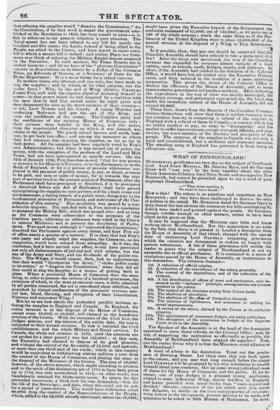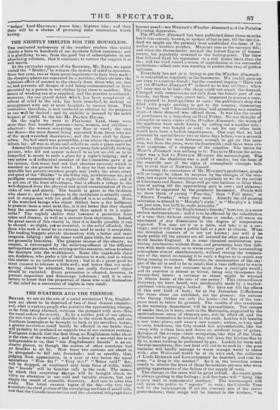WHAT OF NEWFOUNDLAND?
MINISTERIAL gentlemen are very shy on the subject of Newfound- land. Lord JOHN RUSSELL, Mr. SPRING RICE, and Sir GEORGE GREY will " roar you" by the hour together about the other North American Colonies, loyal Nova Scotia and manageable New Brunswick, but cannot be prevailed upon to say a word of poor, neglected Newfoundland.
They never mention it, Its name is never heard ! "
How is this? The colony is as populous and important as New Brunswick ; and they have been challenged to discuss the state of politics in the island. Mr. ROEBUCK dared Sir GEORGE GREY to deny that at the last election the cannon on the hills overlooking St. Johns were loaded and pointed against the people. Sir GEORGE, though voluble enough on other matters, seems to have been silent as the grave on this.
It may be supposed that the Ministers care little and know nothing about Newfoundland. But this supposition is set aside by the fact, that there is at present in London a deputation from the House of Assembly of that island, charged with the special duty of instructing Lord GLENELG respecting grievances which the colonists are determined to endure no longer with patient submission. A list of these grievances will enable the reader to guess why the subject of Newfoundland is not an agreeable one to official gentlemen. It is contained in a series of resolutions passed by the House of Assembly, as instructions to this deputation. The colonists demand-
lst. A reduction of official salaries.
2d. A reduction of the expenditure of the colony generally.
3d. The control of the expenditure, and of the collection of the revenue.
4tb. A fair distribution of offices of trust and emolument, now be. stowed on the "exclusive " principle, among natives and persons resident in the colony.
5th. The control of the revenues arising from Crown lands. 6th. The abolition of pluralities.
7th. The abolition of the office of Controller. General.
Sth. The erection of lighthouses, and assistance in making in•
ternal improvements. 9th. A survey of the mines, claimed by the Crown as its exclusive property.
10th. The appointment of competent Judges, not party politicians. 11th. The abrogation of the permission to Judges of the Supreme Court to sit in the Assembly.
The Speaker of the Assembly is at the head of the deputation appointed to press these reforms on the Colonial Office ; and, by way of supporting the application as effectually us possible, the Assembly of Newfoundland have stopped the supplies ! Now, can the reader divine why it is that the Ministers avoid allusion to Newfoundland ?
A word of advice to the deputation. Trust not the gentle- men of Downing Street. Let them once ship you back again to the colony, and you may wait long enough before the sleepy' Lord GLENELG will be prompted by his wily subalterns to trouble himself about your concerns. Get up some strong individual eases of abuse for the House of Commons and the public. If, for in. stance, one of your Judges is a pleasant young gentleman,
related to some influential Whig, utterly brielless in England, and better provided with music-books than " cases argued and decided," threaten exposure of the job which sent him across the Atlantic, to decide on the lives and properties of colonists; write letters to the newspapers, procure motions to be made, and questions to be asked in both Houses of Parliament. In short, "badger' Lord Gseesso ; rouse him ; frighten him ; and then there will be a chance of procuring some concessions worth having.



























 Previous page
Previous page